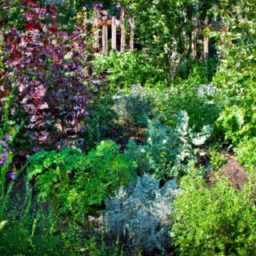-
Erik Ohlsen, a renowned regenerative landscaper, designer, and farmer, is set to share his expertise and insights during an upcoming talk. With 25 years of experience in the field, Ohlsen's knowledge is invaluable for those looking to embrace regenerative gardening practices.
-
As we enter a new year, many individuals are challenging themselves to adopt a regenerative way of life. This sustainable approach aims to restore ecosystems, conserve resources, and create a harmonious relationship with nature. By transitioning to regenerative gardening, we can contribute to a greener future for generations to come.
-
Master naturalist Derek Wade, a native of an island, offers valuable advice on caring for island gardens. By implementing regenerative gardening techniques, we can create spaces that benefit all living creatures, from insects and birds to larger wildlife. Wade's guidance ensures a thriving ecosystem right in our backyards.
The Power of Regenerative Gardening: A Sustainable Path to a Greener Future
Discover the transformative impact of regenerative gardening for a sustainable lifestyle.

To create the best garden for our climate, understanding the local conditions is crucial. By selecting plants that are native or adapted to the region, we can promote biodiversity and reduce the need for excessive watering and chemical interventions. Regenerative gardening practices teach us how to work with nature, rather than against it.
The COVID-19 pandemic has sparked a gardening revolution, with many individuals exploring the joys of backyard gardening. Amanda Nadeau, one such inspired gardener, found solace and companionship in her newly established garden during the early months of the pandemic. Regenerative gardening offered her a fulfilling and sustainable hobby.
Regenerative farming techniques are not limited to large-scale operations. Smallholders, homesteaders, and hobby farmers can also embrace these practices to ensure their own sustainable growth. By nurturing the soil, conserving water, and promoting biodiversity, small-scale growers can contribute to a regenerative food system.
In Cambodia, home victory gardens are transforming lives. Thanks to these gardens, 10,000 people in 2,200 rural households now have increased access to nutritious food. Regenerative gardening plays a vital role in improving food security and nutrition for communities worldwide.
Seedlip and The Ron Finley Project celebrated their collaboration with a Happy Hour event inspired by Finley's own regenerative garden. The event showcased the beauty and potential of regenerative gardening, inspiring guests to embrace sustainable practices in their own homes.
An Israeli couple has found success in operating a thriving market garden in the Coromandel region. Their commitment to regenerative gardening has resulted in a bountiful harvest of over 8,500 kilograms of fruit and vegetables. Their story exemplifies the potential for sustainable agriculture on a smaller scale.
Regenerative gardening is more than just a trend; it is a pathway towards a sustainable future. By implementing these practices, we can restore ecosystems, conserve resources, and promote biodiversity. Together, we can create a greener and more resilient world.
Key Extracted Words: regenerative gardening, sustainable, transition, climate, island gardens, benefits, small-scale growers, food access, collaboration, market garden
Anonymous Image Description: A vibrant and diverse garden showcasing the beauty and abundance of regenerative gardening.
Category: Gardening